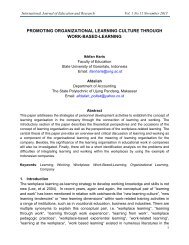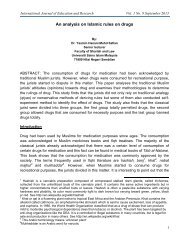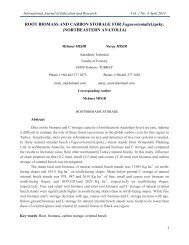A Special Case of Pathetic Fallacy: Papini's Picasso - International ...
A Special Case of Pathetic Fallacy: Papini's Picasso - International ...
A Special Case of Pathetic Fallacy: Papini's Picasso - International ...
Create successful ePaper yourself
Turn your PDF publications into a flip-book with our unique Google optimized e-Paper software.
ISSN: 2201-6333 (Print) ISSN: 2201-6740 (Online)<br />
www.ijern.com<br />
“All the world's a stage,/ And all the men and women merely players:”<br />
There is at least some similarity between that and the Jungian concept <strong>of</strong> persona, hm? I do think<br />
so, indeed.<br />
But, if finding similarities between people living in different centuries and cultural<br />
frameworks would bring a smile on some canonical scholars faces, allow me to tell them that the<br />
last thing some <strong>of</strong> us like to hear about is when the Other tells us how different from us she/he<br />
really is.<br />
To tell the truth, we do not even listen to what other people have to say. Most <strong>of</strong> the time we<br />
indulge in listening to other “persons”, because every other human being is in fact a person, the<br />
same as I consider myself to be. Right? Wrong! Or again, maybe not! The truth about persons lay<br />
somewhere in the middle and that's where it should be, after all! Let us attempt to find out what am<br />
I trying to say here.<br />
When we look to other people we do in fact try to find some similarities, and we do that in<br />
order to make sure that we are <strong>of</strong> the same species, that we abide to the same rules, that we are able<br />
to coexist without killing and eating one another in order to survive. Because, after all, that is<br />
surviving almost all about: a full belly and a place to sleep.<br />
And all the basic assumptions about other people being similar to us, which in fact allows us<br />
even to speak <strong>of</strong> such things as “people” or “humanity” are made through some kind <strong>of</strong> projecting<br />
our own thoughts unto others, making them bear our resemblance, being some kind <strong>of</strong> mirrors for<br />
ourselves. That is how persons are created. We do not really care if they are different and we do not<br />
listen to any <strong>of</strong> their independence proclamations, not even hearing them unless they admit we are<br />
alike. That is part <strong>of</strong> the surviving strategy too. And this is the reason why we speak about humanity<br />
as being made <strong>of</strong> persons. It is a pity though, this way, we manage only to survive. Living, that is<br />
another business.<br />
Let us now twist a little the perspective and take the other side for a moment. The side <strong>of</strong><br />
those speaking <strong>of</strong> themselves as being different. What are they doing when saying “I am in a way<br />
you are not”? Is this the mirrored response <strong>of</strong> “I am the same as you”? I can not tell for sure, but it<br />
looks like it.<br />
Why are they saying that? How do they know in which ways they are different? Are the<br />
differences so easily perceivable? Even those which are kept inside our heads and souls and which<br />
we name thoughts and feelings? Because even if we are somehow different in the way we look, in<br />
our physical appearance, that is not the main argument in the perpetual otherness camp and that<br />
because we have to have something similar in order to be able to communicate and the slogan they<br />
all seem to be taking for granted is this:<br />
“We may look alike but I am different in all other respects!”<br />
In other words she/he is telling you that she/he is different from you in all those important<br />
features. And she/he does that probably thinking that different means better. That is another aspect<br />
<strong>of</strong> the surviving strategy <strong>of</strong> men. Or beasts, for all that matters.<br />
But how is discrimination really accomplished? How do they know they are so different<br />
after all? They do not, if you want my answer!<br />
All the difference is made between how they want to be perceived and how they would not<br />
4





